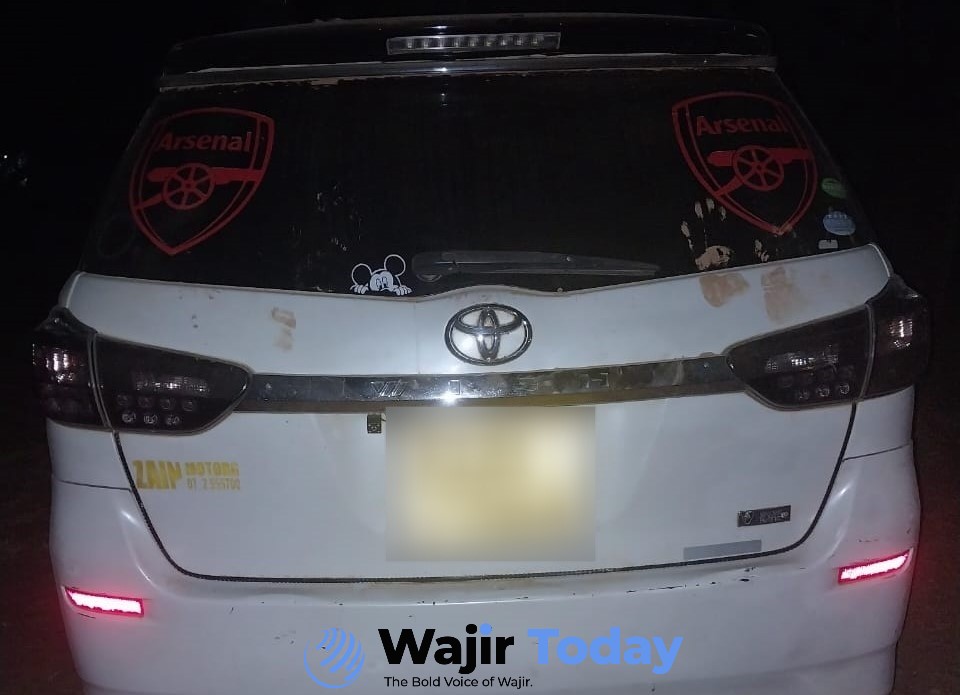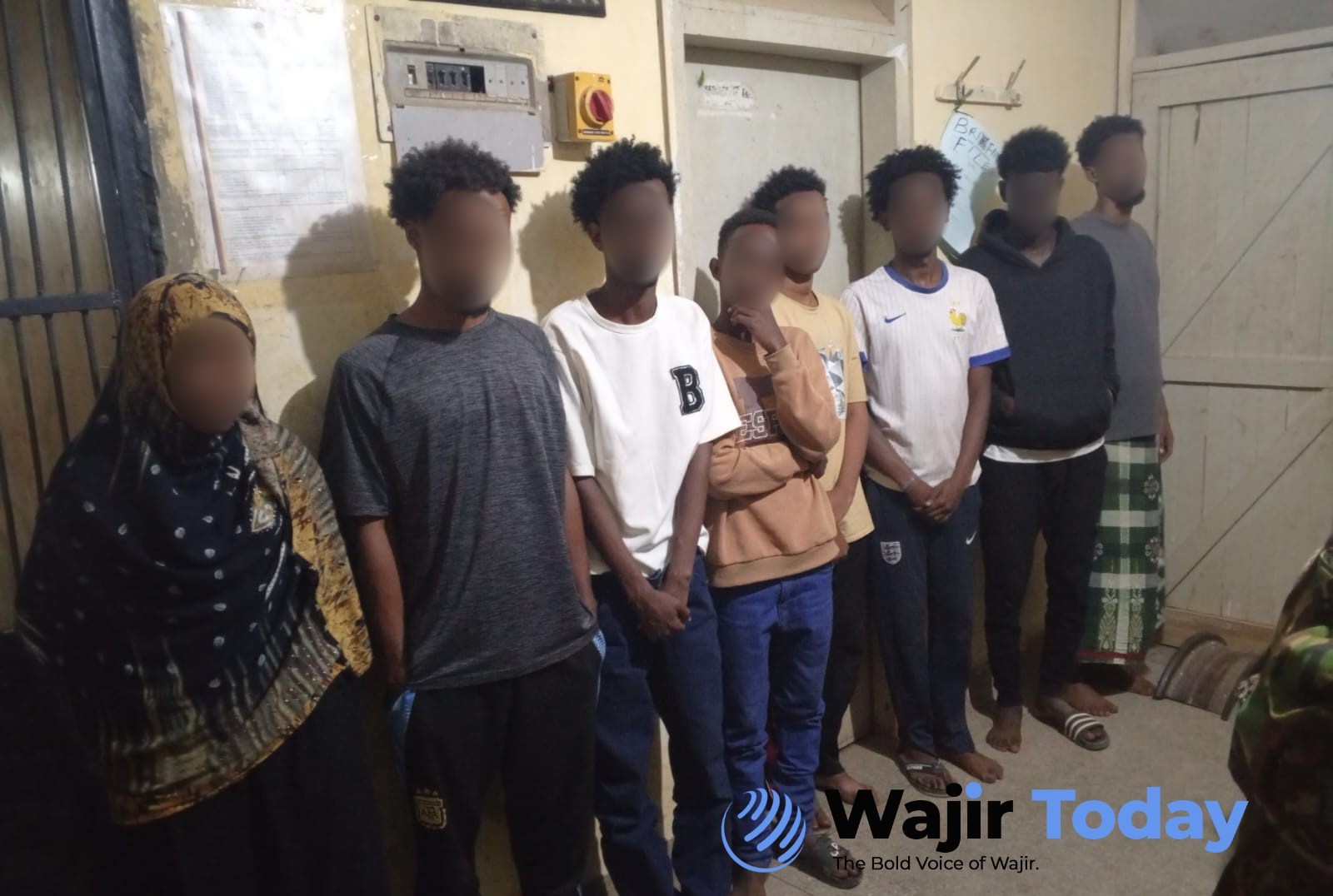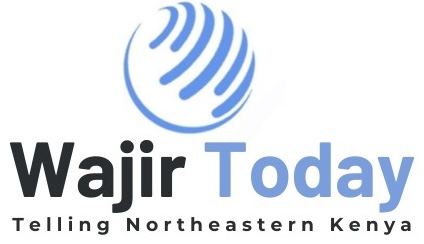
By Wajir Today Reporter
It was just before midnight when a white Toyota Wish pulled up at a dusty roadblock deep in Gurar Division, Wajir North. Inside, ten young passengers tired and vaguely evasive told police they were on their way to a wedding in neighbouring Moyale.
But something didn’t sit right with the officers manning the Bambaa checkpoint. Within minutes, what had appeared to be a routine inspection unraveled into a suspected case of human trafficking, spotlighting a growing crisis in Kenya’s northeastern counties.
Police say the vehicle was intercepted at around 11:45pm by officers from Gurar Police Station, who were conducting a night patrol. A quick headcount revealed ten youthful passengers packed into the vehicle, a curious number for a small car supposedly headed to a festive occasion.
Initially, the group insisted they were wedding guests. But pressed for details by police, they admitted that they were enroute to Libya, using the Moyale Kenya-Ethiopia corridor, a well-known route for irregular migration.
The driver claimed to have been hired from Nairobi. He maintained that his assignment was to drive the youths to Moyale for a wedding. But authorities were not convinced with his explanations.
The group, including the driver, was arrested and transported to Bute Police Station for further interrogation. The investigations are now underway to determine the full extent of the network involved and whether this was part of a larger smuggling ring that preys on vulnerable youths from the region.
“This is about exploitation and endangerment,” said an officer familiar with the case, speaking on condition of anonymity. “These young people are being lured by false promises, only to face ransom demands.”
Locally referred to as Tahrib, the trend of youths being smuggled through Kenya’s northern corridors into North Africa has become a grave concern in recent months. Many leave behind desperate families, sell property to fund the journey, or fall victim to smugglers who hand them over to militia groups or traffickers across the border.
The community leaders in Wajir have raised the alarm repeatedly. They say poverty, unemployment, and a lack of awareness are fueling the problem. Yet responses remain fragmented.
The local human right defenders have urged parents and elders to speak openly with their children about the dangers of human trafficking. At the same time, calls are growing for a more coordinated government crackdown on smuggling networks and greater investment in opportunities for local youth.
Wajir has come under the spotlight for escalating cases of human trafficking, where tens of local youth have fallen victim to smugglers luring them with promises of job opportunities in Europe and America.
Revelations at a recent human rights forum organized by Kenya National Commission on Human Rights in collaboration with Trace Kenya highlighted escalating cases of human trafficking, where youth have fallen victim to smugglers.
Maalim Warsame (not his real name) a relative to a victim of human trafficking told the forum which brought together both State and non-state actors in Wajir, about the untold suffering of families of victims of human trafficking.
Giving a chilling account of the victim’s story from the day he went missing up until his first communication, Mr. Warsame said human trafficking is not only a problem to immediate families, but it’s also affecting the entire community emotionally, socially and economically.
Three weeks after their son went missing from Wajir, a desperate call confirmed the family’s fear. Their son has fallen into the hands of a notorious gang commonly known as Magafes in Libya, a fragile state known for global human trafficking syndicate.
According to US Department of State’s 2024 Trafficking in Persons Report, Libya harbours extra-legal armed groups, including foreign mercenaries that continue to fill a security vacuum across the country. These disparate armed groups commit various human rights abuses, including unlawful killings, abuse of migrants and refugees, forcible recruitment, forced labor, and trafficking.
The Magafes in Libya have sent Mr. Warsame’s family a video of the victim under torture demanding for a ransom of a whooping Ksh. 2.2 million with consequences of lengthy detention and further torment in case of delayed payment.
“We have no otherwise, we saw the graphic video of torture. We had to mobilize resources as urgently as possible”
Listless and depressed, family members convened for an urgent meeting to raise the funds to rescue their son from the hands of the gang that kept on threatening every single day.
“The most painful part is the financial burden. For our case, it was a big challenge to raise such a huge amount within such a short time and from a family with no means” Mr. Warsame said
With Wajir’s mundane economy where many families are paying their bills in dribs and drabs, the Magafe’s huge ransom demand has become an economic monster, draining households and emptying the pockets of the community.
“With this economy, it took us a lot of efforts and so many sleepless nights to raise the money. At long last, we paid the ransom in four installments” He narrated
The case remains under police investigation and the victim now faces an uncertain future in Libya, a stark reminder that the journey he had hoped would lead to a better life, had cost his family everything, while putting his own life on the edge.
The story of Warsame’s family is a just one among many other untold stories of victims of human trafficking in Wajir county where families continue to bear the financial and emotional burden of the complicated transnational crime.
Heartbroken and helpless, many parents in Wajir are unable to meet the exorbitant ransom demands. The experience has forced mothers to sell their earrings and fathers to sell their plots and herds of goats at throw away prices.
According to mental health officials, at this rate of destitution, Wajir will have to brace for an increasing number of psychiatric cases as mentally and financially tormented parents reach a psychological breaking point.
Hotspot for trafficking

“Wajir has sadly become a hotspot for human trafficking. Hardly a day passes without being added to a WhatsApp group raising funds for victims who have fallen prey to traffickers” said Mohamed Mohamud a resident in Wajir
Human trafficking is now the common talk of the town and one of the emerging issues affecting almost every household and neighborhood in Wajir directly or indirectly. The local community is facing a crisis of monumental proportion dealing with the ugly economic and social impacts of the vice.
“We are really worried about the impact of human trafficking that has become a concern for Wajir communities,” said Abdishakur Adan, the Executive Director of African Social Development Focus (ASDEF), one of the local organisations in Wajir
Trafficking is an offshoot of rising unemployment rates. It has a become an approach to salvage economic desperation as the overwhelming majority of youth sit idle at homes, twiddling their fingers with little or nothing to do.
In his recent Eid al-Adha message Wajir Governor Ahmed Abdullahi acknowledged the issue of trafficking as one of the current problems facing the county, affecting many youths.
The vast county is sitting on a powder keg of poverty. With a staggering 64% poverty rate, it ranks among the hardest-hit in Kenya where nearly two-thirds of the population live below the poverty line.
According to a recent policy brief by the Kenya Institute for Public Policy Research and Analysis (KIPPRA), Wajir County has a working-age population of 376,933, roughly 48.25% of the total population. The majority of them are youth aged 18–34, most of whom have no source of income or livelihood.
With no jobs, no functional industries, and a lack of economic infrastructure, the mental toll of poverty is silently eroding the spirit of young people. They are falling into the hands of merciless Magafes in faraway land in unprecedented large numbers.
With traffickers changing their recruitment tactics, more and more youth are expected to fall victims, further raising the concern of community stakeholders
Traffickers are tapping into the dark web for recruitment. They are also exploiting social media and online dating platforms to lure unsuspecting teenagers seeking job opportunities abroad.
In the case of Wajir, traffickers are using more brazen recruitment options including a WhatsApp audio recording that is circulating amongst the youths, promising them a smooth and costless journey to Libya.
Trafficking has become a crisis unfolding before our eyes. With drug addiction also taking toll on them, Wajir youth are facing a bleak future, one that damages their hopes and aspirations.
“How long will we keep on asking for Harambes to raise ransom money that are beyond the reach of many poor families in Wajir” Mr. Warsame wonders
That question about how long will the local community bear the brunt of social and economic impact of trafficking has become a jigsaw puzzle. The residents are caught in the ambivalence of what to do next.
Urgent Awareness
the stakeholders are now calling for an urgent awareness campaign about the dangers of trafficking. They are seeking to harnesses a multisectoral approach to educate the public.
In its engagement with state and non-state actors in the forum, KNCHR has already jumpstarted the conversation on how to curb the menace of human trafficking seeking to employ a human rights approach to the problem.
“We need to find local solutions to these local problems” said Hassan Abdi Omar, the Regional Coordinator of KNCHR. “My appeal is for all of us to join the war against trafficking”
The human rights defenders believe that any campaign that seeks to address the problem of trafficking must start from addressing the root causes. Which means campaigns should also include capacity building and empowerment of local youth.
“Apart from sensitizing the public and youth about trafficking, we should also encourage the youth to take more of skilled -based courses to increase their chances of employability. This approach may help us address the problem of unemployment” added the Regional Coordinator.
As the discussions about trafficking kicks off in Wajir, human rights defenders, community leaders, civil society and law enforcement agencies are looking forward to protect the vulnerable youth from falling into the hands trafficking syndicate.
“We need urgent actions to address this problem. I believe we must start an awareness campaign as soon as possible to address the rising cases of Tahrib” said Mr. Warsame

